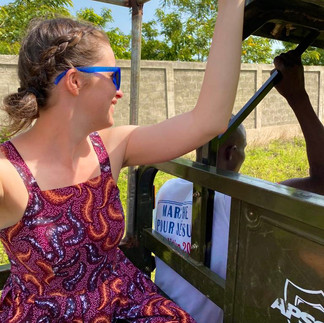A Chance To Reaffirm The Sense of Purpose
- janniep7
- Jun 1, 2023
- 3 min read
written by Sydney Bertram
This March, almost three years to the day after an emergency flight back home from my study abroad semester in Dakar, Senegal, I again boarded a flight back to West Africa. This time I was headed further south to Lomé, Togo. In March of 2020, no one could have foreseen how “the next few months” would blur into “the next few years.” As I am sure each of you can relate to, the last few years have been in many ways a list of losses: the second half of my study abroad semester, a trip to Paris, a normal 21st birthday, family funerals, holidays without fear of infecting family members, and college graduation in its usual form. As March 11, 2023, the date on my ticket to Lomé approached, my excitement to travel was tinged with a sense that this trip too could disappear without warning.
To my joyful surprise, the plane did not crash during takeoff, there were no family emergencies, and the World Health Organization did not declare a new pandemic while I was in mid-air. Barring a missed connection in JFK, my travel was smooth, and I felt the warm wall of air outside of the Lomé airport as an assurance that, after all, God is faithful. Watching global health fail again and again over the course of the COVID-19 pandemic, I questioned many times whether or not global health was truly the field to which I felt called. Traveling to Togo was a chance to reaffirm the sense of purpose that drove me to enter medical school.
While in Togo, I lived for four weeks on the campus of the Agbélouvé Health Center, where I was immersed in the work of the center and everyday life of the staff. I found that everyone was eager to know me, to help me understand their community, and to teach me their approach to improving each patient’s health. In the mornings, I worked with the team to provide care for everyone who walked through the clinic door. Much like in a United States primary care clinic, we saw many cases of headache and high blood pressure. However, patients also received care for malaria, schistosomiasis, and Buruli ulcer - diseases that are almost nonexistent in the USA.
In the afternoons, I worked with staff to implement several new prenatal care programs at the health center. During my month in Togo, we established a new payment model for prenatal care, implemented reminder phone calls prior to each scheduled appointment, and provided free transportation to the clinic. Each of these changes are meant to empower Togolese women to overcome common barriers to receiving adequate prenatal care. Over the last month, more than half of women establishing prenatal care at the health center have chosen to use the new payment model, and every woman attending a return appointment received a reminder phone call. Getting the word out about the new free transportation has proven more difficult, but over the last week several women utilized it to attend their appointments. These are successes that we hope will continue as we evaluate the program over the next year.
While I am proud of my project and its early results, what I valued most about my time in Togo were the relationships that were fostered. I found that many of the staff in-training were close to my age, and we enjoyed learning together. In our free time, we ran through practice cases and quizzed each other on pharmacology. One of the highlights of my time in Togo was teaching and being taught by Togolese students who are as invested in their learning as I am in mine.
The patients at the Agbélouvé Health Center were equally good teachers. They entrusted me with details about their homes, farms, and families. They were patient with my occasionally faltering French and almost non-existent Ewe. We were all speaking in our second language words that humans often prefer to whisper ~ a hospitalization that would cost a month’s income, a first trimester pregnancy, a moment of despair. I found immense meaning in the trust we all chose each day. I trusted my colleagues to interpret Ewe into French so I could communicate with patients, and my colleagues trusted me to contribute meaningfully to clinical work. I trusted our patients to tell me the full story of their illnesses, and our patients trusted me to listen to their lungs, look in their ears, and tap for their reflexes. I was trusted to witness births, introduce newborns to their fathers, and stand watch with the team over children struggling to breathe.
I expect these moments might come to feel routine as I continue my medical training, but I am hopeful that my experience in these moments, when I was trusted even as an outsider, will always remind me of the weight - and the miracle - of becoming a physician.










Comments